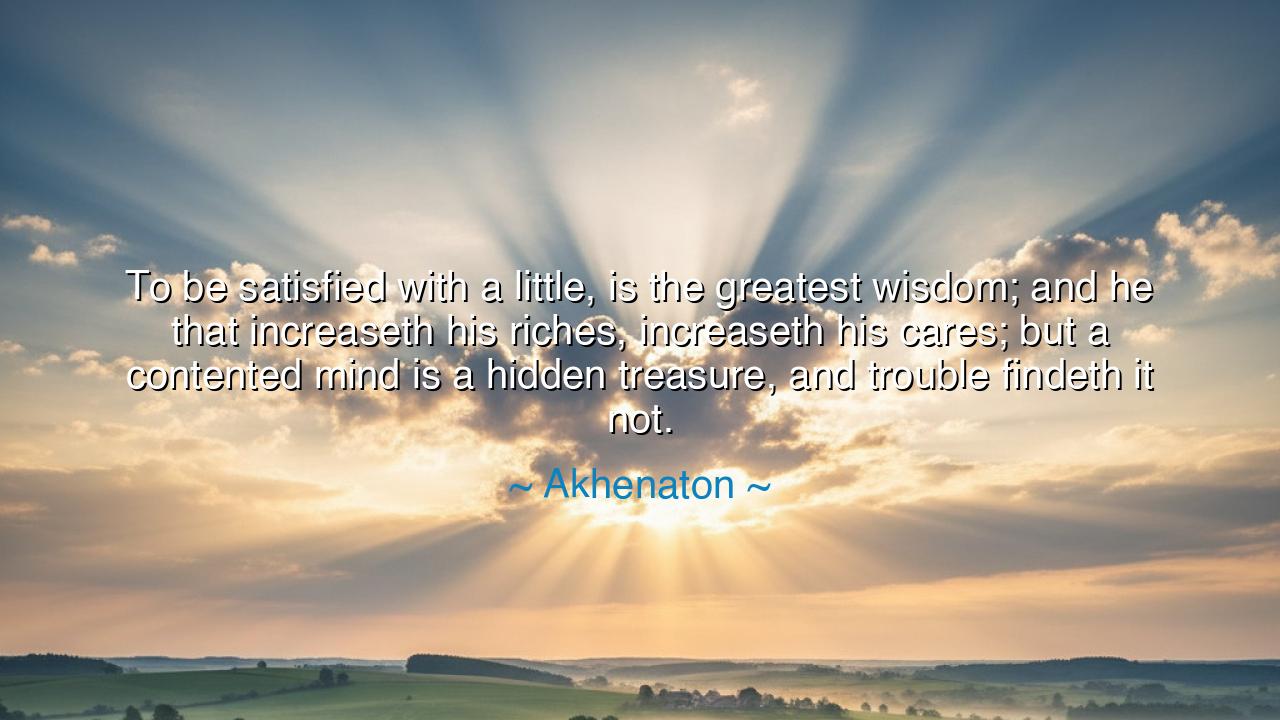
To be satisfied with a little, is the greatest wisdom; and he
To be satisfied with a little, is the greatest wisdom; and he that increaseth his riches, increaseth his cares; but a contented mind is a hidden treasure, and trouble findeth it not.






"To be satisfied with a little is the greatest wisdom; and he that increaseth his riches, increaseth his cares; but a contented mind is a hidden treasure, and trouble findeth it not." Thus spoke Akhenaton, the pharaoh who sought the light of truth in a land of gods and kings. His words carry across the centuries a lesson as enduring as the stones of Egypt: that the wealth of the world is heavy, but the wealth of the spirit is light.
The ancients knew well the burden of abundance. Kings who gathered gold beyond measure often found no rest, for fear stalked them by night and envy consumed them by day. But the shepherd, with only bread and water, often sang with joy. To be satisfied with little is to master desire, and mastery of desire is greater than mastery of nations. For wisdom is not in multiplying possessions, but in learning that enough is already abundance.
Consider the life of Diogenes the Cynic. He cast away riches, choosing instead to live in a simple barrel, with the sky as his roof and the earth as his bed. Though mocked by many, he declared himself freer than kings, for he was owned by nothing and troubled by no fear of loss. When Alexander the Great came to him and asked what he could give, Diogenes replied only, "Stand out of my sunlight." Here was the contented mind Akhenaton praised—a treasure no power could buy.
History also remembers Emperor Marcus Aurelius. Though ruler of Rome, his meditations reveal a soul that sought peace not in palaces but in inner harmony. Surrounded by wealth, he warned himself that possessions bring weight, not freedom. His words, like Akhenaton’s, declare that the true empire lies within, where a contented mind shields the soul from the assaults of fortune.
So let this wisdom be handed down: he who heaps riches builds not joy but chains; he who cultivates contentment builds a fortress unseen. A contented mind is indeed a hidden treasure, safe from thieves, free from envy, and untroubled by fate. Seek not endless increase, for in the endless chase lies weariness. Seek instead the art of being satisfied with little, and you shall walk lighter than kings, carrying within yourself the eternal crown of peace.






KNBao Khanh Nguyen
I find this quote powerful because it’s a reminder that happiness doesn’t always lie in having more. But it also raises questions about how we define richness. Is it purely financial, or can richness be found in relationships, experiences, and personal fulfillment? How do we shift our mindset to view contentment as a treasure in itself, and not as something lacking? Can we measure success without focusing on material wealth?
LNLe Nhu
Akhenaton’s words seem like a perfect antidote to the stress and anxiety that come with modern life. But isn’t there also a danger in being too content? Could too much contentment lead to stagnation or a lack of motivation? How do we find the sweet spot where we are happy with what we have but still remain motivated to improve and grow in other aspects of our lives? I’d love to hear how others balance this tension.
QNQuynh Nhu
This quote makes me question how much of our desire for more is truly rooted in happiness. Are we conditioned to think we need more possessions, wealth, or achievements to feel fulfilled, when in reality, the less we have, the more we might appreciate life’s simple joys? But does this mean that striving for progress, both personal and professional, is inherently wrong? Can you still strive for growth while being content with less?
DQLuong dình quóc
I think Akhenaton is pointing out something very important about the inner peace that comes from contentment. But if we’re being honest, isn’t it difficult to embrace this mindset in a society that equates happiness with wealth and status? How do we begin to redefine success in a way that celebrates contentment over material gain? Can contentment be achieved without the risk of being seen as complacent or lazy by others?
DLDang Le
This quote really resonates with me, especially in a world where we're constantly told to want more, to keep striving for wealth and success. But what if the pursuit of 'more' only brings more stress and dissatisfaction? Can we truly be content with less, or is that just an idealistic fantasy? How do we find that balance between ambition and contentment, and is it possible to truly escape the pressure to keep accumulating?